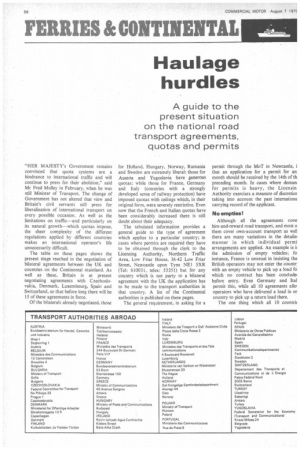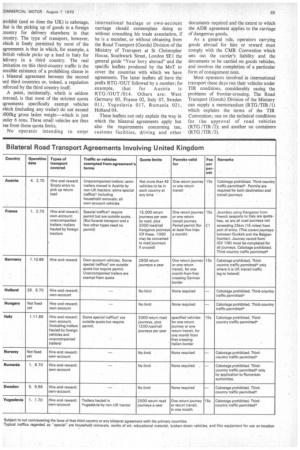FERRIES ac CONTINENTAL
Page 60

Page 61

If you've noticed an error in this article please click here to report it so we can fix it.
Haulage hurdles
A guide to the present situation on the national road transport agreements, quotas and permits
"HER MAJESTY's Government remains convinced that quota systems are a hindrance to international traffic and will continue to press for their abolition." said Mr Fred Mulley in February, when he was still Minister of Transport. The change of Government has not altered that view and Britain's civil servants still press for liberalization of international transport on every possible occasion. As well as the limitations on traffic—and particularly on its natural growth—which quotas impose, the sheer complexity of the different. regulations applied by different countries makes an international operator's life unnecessarily difficult.
The table on these pages shows the present stage reached in the negotiation of bilateral agreements between the UK and countries on the Continental mainland. As well as these, Britain is at present negotiating agreements with Czechoslovakia, Denmark, Luxembourg, Spain and Switzerland, so that before long there will be 15 of these agreements in force.
Of the bilaterals already negotiated. those for Holland, Hungary, Norway, Rumania and Sweden are extremely liberal: those for Austria and Yugoslavia have generous quotas; while those for France, Germany and Italy (countries with a strongly developed sense of railway protection) have imposed quotas with ceilings which, in their original form, were severely restrictive. Even now that the French and Italian quotas have been considerably increased there is still doubt about their adequacy.
The tabulated information provides a general guide to the type of agreement which applies to a particular country; in cases where permits are required they have to be obtained through the clerk to the Licensing Authority, Northern Traffic Area, Low Friar House, 36-42 Low Friar Street, Newcastle upon Tyne NEI 5XR (Tel: 610031, telex: 53351) but for any country which is not party to a bilateral agreement with the UK the application has to be made to the transport authorities in that country. A list of the Continental authorities is published on these pages.
The general requirement, in asking for a permit through the MoT in Newcastle, i that an application for a permit for an month should be received by the 14th of th preceding month. In cases where demi} for permits is heavy, the Licensin Authority exercises a measure of discretior taking into account the past internatiom carrying record of the applicant.
No empties1 Although all the agreements cove hire-and-reward road transport, and most o them cover own-account transport as well there are many variations in the detailel manner in which individual permi arrangements are applied. An example is ii the admission of empty vehicles; fo instance, France is unusual in insisting tha British operators may not enter the countr; with an empty vehicle to pick up a load fo which no contract has been concludel before entry. Even Germany and Ital permit this, while all 10 agreements alio' operators who have delivered a load in or country to pick up a return load there.
The one thing which all 10 countric )rohibit (and so does the UK) is cabotage, hat is the picking up of goods in a foreign :ountry for delivery elsewhere in that :ountry. The type of transport, however, which is freely permitted by most of the tereements is that in which, for example, a 3ritish vehicle picks up a load in Italy for lelivery in a third country. The real imitation on this third-country traffic is the )ossible existence of a prohibiting clause in t bilateral agreement between the second ind third countries or, indeed, a regulation nforced by the third country itself.
A point, incidentally, which is seldom tressed, is that most of the strictest quota igreements specifically exempt vehicles vhich (including any trailer) do not exceed )000kg gross laden weight—which is just Hider 6 tons. These small vehicles are thus ree from those quota limits.
No operator intending to enter international haulage or own-account carriage should contemplate doing so without consulting his trade association, if he is a member, or without obtaining from the Road Transport (Goods) Division of the Ministry of Transport at St Christopher House, Southwark Street, London SE1 the general guide "Your lorry abroad" and the specific leaflets produced by the MoT to cover the countries with which we have agreements. The latter leaflets all have the prefix RTG /OUT followed by a number; for example, that for Austria is RTG /OUT /014. Others are: West Germany 05, France 02, Italy 07, Sweden 011, Yugoslavia 017. Rumania 021, Holland 04.
These leaflets not only explain the way in which the bilateral agreements apply but also the requirements concerning tax, customs facilities, driving and other documents required and the extent to which the ADR agreement applies to the carriage of dangerous goods.
As a general rule. operators carrying goods abroad for hire or reward must comply with the CMR Convention which sets out the carrier's liability and the documents to be carried on goods vehicles, and involves the completion of a particular form of consignment note.
Most operators involved in international transport these days run their vehicles under TIR conditions, considerably easing the problems of frontier-crossing. The Road Transport (Goods) Division of the Ministry can supply a memorandum (RTG /TIR /1) which explains the terms of the TIR Convention; one on the technical conditions for the approval of road vehicles (RTG /TIR /2); and another on containers (RTG /TIR /3).




































































































































